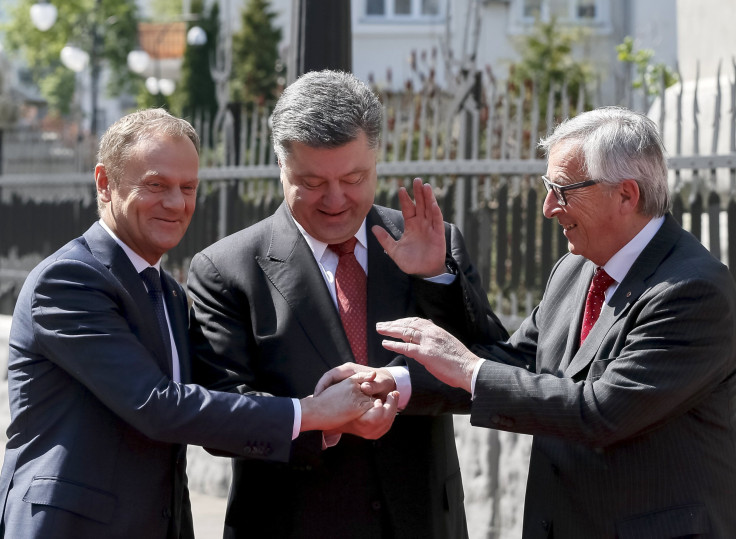As Shelling Intensifies, EU Tells Ukraine To Clean Up If It Wants Aid In Conflict With Pro-Russians

European leaders told Ukrainian President Petro Poroshenko Monday the European Union may help Kiev in its fight against pro-Russian separatists, but only if Ukraine cleans up corruption first. The comments came at the first EU-Ukraine summit since the beginning of the war against the separatists and amid reports from the Organization for Security and Co-operation in Europe, charged with overseeing the ceasefire, that the flashpoint village of Shyrokyne, just 20 kilometers (12.5 miles) from the port city of Mariupol, is experiencing the most intense shelling since the ceasefire came into force Feb. 15. Fierce shelling also continues between pro-Russian rebels and Ukrainian forces in the de-facto rebel capital city of Donetsk.
"You have a powerful enemy, but you also have a lot of friends. You can count on their help, but it will not be enough unless you yourself change Ukraine," European Commission President Donald Tusk said ahead of the summit.
Ukraine is facing calls from the EU to clean up corruption in the country. Tusk is pressuring Ukraine to hurry anti-corruption reforms to help stabilize Ukrainian politics and the business sector, in return for co-operation and closer ties with Europe.
The government has formed a new anti-corruption body to spearhead the fight against corruption in a banking system plagued by suspected ties to organized crime, long seen as an obstacle to closer European integration.
"The new Ukraine is determined to live up to its obligations," Poroshenko wrote in a comment piece in the Guardian newspaper last week. "Ukraine will push forward on its path to the European Union in spite of the many obstacles."
But before Ukraine can concentrate fully on the EU’s goals, Poroshenko said, it needs help purging its industrial centers in the east of pro-Russian rebels who have captured large parts of the Donbas region since the war began in April 2014. To do that, he said, Ukraine must be given lethal aid, a euphemism for weapons, in addition to the non-lethal aid and training it already is receiving.
Without the ability to match militarily the rebels, who the West alleges, but Moscow denies, are supported by Russia, some fear the war will remain in a static state, also known "frozen conflict."
Speaking to Ukrainian broadcaster Podrobnosti Nedeli Sunday, former U.S. Ambassador to Russia Michael McFaul said a frozen conflict is exactly what Russian President Vladimir Putin wants.
“I predict that there will be no war, no peace. There will be uncertainty: a little war, a little peace. The conflict will neither be settled nor resolved. This situation is in the interests of Putin," McFaul said. "Putin does not need the resolution of the conflict. He wants to continue to put pressure on Ukraine. Probably, to achieve its economic collapse.”
Ukraine has also recently lobbied for a visa-free travel regime with the European Union, something to which the bloc is unlikely to agree until it deems Ukraine has gained full control over its porous borders.
But while talks between Ukrainian and EU officials will continue Tuesday, on the ground shelling and the use of heavy weapons have intensified.
The OSCE's Special Monitoring Mission to Ukraine reported observing “sporadic to continuous exchanges of fire involving small arms, machine gun, and rocket-propelled and automatic grenade launchers." The group also reported witnessing “69 outgoing tank shots” and “191 mortar rounds,” while not specifying who was firing at whom.
The organization's monitors also said they are witnessing a buildup of armored vehicles and artillery. An OSCE drone spotted 11 tanks passing through rebel-controlled areas near Shyrokyne, close to the Sea of Azov. “Additionally, over the last three days the [drone] has sighted 17 tanks, three self-propelled howitzers and 60 [armored personnel carriers]” in areas controlled by rebels with the self-proclaimed Donetsk People's Republic, the OSCE report said.
Leaders from six former Soviet Republics are scheduled to meet EU leaders at a summit in Latvia next month. The summit is expected to discuss military security on Europe’s border with Russia.
© Copyright IBTimes 2024. All rights reserved.





















